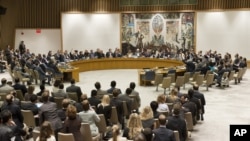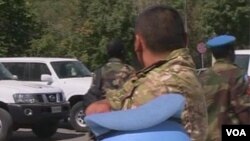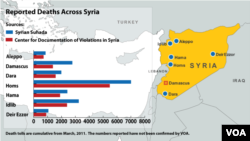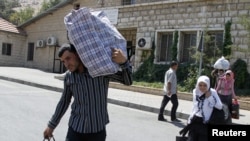NEW YORK — As fighting intensified in Syria, and with international diplomacy at a near standstill, the U.N. Security Council unanimously approved a 30-day extension to a monitoring mission on Friday.
However, the U.S. and Russia were at odds over whether the vote ends the observers' work.
The U.S. said the vote allows the 300 unarmed military observers to begin to shut down their mission. The observers have been deployed under U.N. envoy Kofi Annan's peace plan to end the 16-month conflict, but have been largely ineffective as fighting raged and Mr. Annan's overtures failed to stem the violence.
"The decision we took was to extend the UNSMIS's mission for a final period of 30 days to allow it to withdraw safely and orderly - in an orderly fashion," U.S. ambassador Susan Rice said. "And we hope very much that the withdrawal will be conducted with the principal priority placed on the security of U.N. personnel."
But Russian ambassador Vitaly Churkin denied that the resolution calls for a mission pullout.
The resolution said the Security Council is willing to renew the observer mission after the 30-day mandate expires in August, but only if the use of heavy weapons ends and the level of violence is reduced by all sides.
“It is a resolution about the continuation of the activity of the mission," he said. "If a decision were to be taken not to extend the mission, then of course it can withdraw very quickly and I hope safely.
"But this is not about withdrawal and I think we should not disorient the mission and the international community by describing it as a withdrawal resolution,” he said.
The council action comes after Russia and China, on Thursday, vetoed a U.N. resolution that would have imposed consequences on Syria if it failed to halt the violence.
New Avenues
After the vote, the U.S. and Britain vowed to address the situation in Syria through other means.
In London, British Foreign Secretary William Hague said the Syrian opposition needs more help.
“We will all be doing more outside the Security Council and intensifying our work to support the Syrian opposition, to give humanitarian aid outside the work of the Security Council,” he told the BBC.
On Friday, Russia rejected Western criticism of its veto.
"It is absolutely unacceptable that some Western countries are trying to lay the blame for the escalating Syrian violence on Russia's refusal to support a resolution threatening sanctions against the authorities," foreign ministry spokesman Alexander Lukashevich said.
China's state media on Friday defended Beijing's veto.
"Unfortunately, some Western countries hastily pushed for a vote on the immature draft, which, if adopted, will only lead to more violence in Syria," Chinese state media said.
U.N. Secretary General Ban Ki-moon, speaking at a news conference during a visit to Slovenia on Friday, said the failure of the Security Council to approve a resolution on Syria was deeply disappointing. But he said that he and envoy Annan will press ahead to try and end the violence and abuses in Syria.
Fighting rages
The U.N. activity comes as more fighting was reported throughout Syria.
Syrian activists say more than 300 people were killed across Syria on Thursday, in what is believed to be the deadliest day in the uprising against President Bashar al-Assad.
The London-based Syrian Observatory for Human Rights said Friday that nearly 100 of the people killed in the violence were government troops. Many civilians also were killed.
Syrian state media reported that government troops have recovered full control of a volatile neighborhood in Damascus, the Midan District.
The capital has been the scene of fierce clashes this week between Syrian troops and rebel forces. Wednesday, a rebel bomb blast killed three senior military figures with close ties to President Assad. State television Friday said the country's national security chief, Gen. Hisham Ikhtiyar, has also died of wounds suffered in the blast.
The rebels seized control of major border posts with Iraq and Turkey Thursday, leading Iraqi officials to close off the border with Syria. Iraq also said the rebels killed at least 21 Syrian soldiers at the crossing.
Syrians flee
But Syria's main border crossing with Lebanon was quiet Friday, the day after an estimated 20,000 Syrians crossed to flee the increasing fighting.
Lebanese officials on the border had prepared for another busy day.
But it was more of a trickle than a flood, and none of the Syrians coming across into Lebanon described themselves as refugees. On a Friday at the start of Ramadan, they might have been coming to visit family, as they claimed.
Many of the refugees who came over on Thursday were believed to be supporters of President al-Assad from Damascus and its suburbs.
“No one better will come after Assad," said one such driver, who crossed Friday for a two-day visit. "It's not possible. There is no one better than him. Eighty-five percent of the people are with him and 15 percent are getting paid to be against him.”
Volunteers from the International Committee of the Red Cross were ready to help, but were not needed.
A local Muslim relief organization also swung into action, finding space for refugees in schools and homes. But much of the space was not used. Most of Thursday's refugees were well off and could afford to rent apartments or hotel rooms.
More refugees
Still, Ali Abdul Khalek of Muslims Without Borders is concerned that more, and poorer, refugees will come if the trouble in Syria continues.
“Lebanon can't absorb a large number of refugees," he said. "The population of Damascus is equal to the population of all of Lebanon. Lebanon can't do this by itself without international help.”
Along the row of shops near the border, the Syria crisis is having a different impact. Business at Ahmed Al-Ajami's family electronics store is down 70 percent because fewer Syrian tourists are coming by.
“Business was very good," he said. "The store was bustling. Now, there is nothing since the beginning of the war in Syria. The last month-and-a-half it is nothing at all.”
However, the U.S. and Russia were at odds over whether the vote ends the observers' work.
The U.S. said the vote allows the 300 unarmed military observers to begin to shut down their mission. The observers have been deployed under U.N. envoy Kofi Annan's peace plan to end the 16-month conflict, but have been largely ineffective as fighting raged and Mr. Annan's overtures failed to stem the violence.
"The decision we took was to extend the UNSMIS's mission for a final period of 30 days to allow it to withdraw safely and orderly - in an orderly fashion," U.S. ambassador Susan Rice said. "And we hope very much that the withdrawal will be conducted with the principal priority placed on the security of U.N. personnel."
But Russian ambassador Vitaly Churkin denied that the resolution calls for a mission pullout.
The resolution said the Security Council is willing to renew the observer mission after the 30-day mandate expires in August, but only if the use of heavy weapons ends and the level of violence is reduced by all sides.
“It is a resolution about the continuation of the activity of the mission," he said. "If a decision were to be taken not to extend the mission, then of course it can withdraw very quickly and I hope safely.
"But this is not about withdrawal and I think we should not disorient the mission and the international community by describing it as a withdrawal resolution,” he said.
The council action comes after Russia and China, on Thursday, vetoed a U.N. resolution that would have imposed consequences on Syria if it failed to halt the violence.
New Avenues
After the vote, the U.S. and Britain vowed to address the situation in Syria through other means.
In London, British Foreign Secretary William Hague said the Syrian opposition needs more help.
“We will all be doing more outside the Security Council and intensifying our work to support the Syrian opposition, to give humanitarian aid outside the work of the Security Council,” he told the BBC.
On Friday, Russia rejected Western criticism of its veto.
"It is absolutely unacceptable that some Western countries are trying to lay the blame for the escalating Syrian violence on Russia's refusal to support a resolution threatening sanctions against the authorities," foreign ministry spokesman Alexander Lukashevich said.
China's state media on Friday defended Beijing's veto.
"Unfortunately, some Western countries hastily pushed for a vote on the immature draft, which, if adopted, will only lead to more violence in Syria," Chinese state media said.
U.N. Secretary General Ban Ki-moon, speaking at a news conference during a visit to Slovenia on Friday, said the failure of the Security Council to approve a resolution on Syria was deeply disappointing. But he said that he and envoy Annan will press ahead to try and end the violence and abuses in Syria.
Fighting rages
The U.N. activity comes as more fighting was reported throughout Syria.
Syrian activists say more than 300 people were killed across Syria on Thursday, in what is believed to be the deadliest day in the uprising against President Bashar al-Assad.
The London-based Syrian Observatory for Human Rights said Friday that nearly 100 of the people killed in the violence were government troops. Many civilians also were killed.
Syrian state media reported that government troops have recovered full control of a volatile neighborhood in Damascus, the Midan District.
The capital has been the scene of fierce clashes this week between Syrian troops and rebel forces. Wednesday, a rebel bomb blast killed three senior military figures with close ties to President Assad. State television Friday said the country's national security chief, Gen. Hisham Ikhtiyar, has also died of wounds suffered in the blast.
The rebels seized control of major border posts with Iraq and Turkey Thursday, leading Iraqi officials to close off the border with Syria. Iraq also said the rebels killed at least 21 Syrian soldiers at the crossing.
Syrians flee
But Syria's main border crossing with Lebanon was quiet Friday, the day after an estimated 20,000 Syrians crossed to flee the increasing fighting.
Lebanese officials on the border had prepared for another busy day.
But it was more of a trickle than a flood, and none of the Syrians coming across into Lebanon described themselves as refugees. On a Friday at the start of Ramadan, they might have been coming to visit family, as they claimed.
Many of the refugees who came over on Thursday were believed to be supporters of President al-Assad from Damascus and its suburbs.
“No one better will come after Assad," said one such driver, who crossed Friday for a two-day visit. "It's not possible. There is no one better than him. Eighty-five percent of the people are with him and 15 percent are getting paid to be against him.”
Volunteers from the International Committee of the Red Cross were ready to help, but were not needed.
A local Muslim relief organization also swung into action, finding space for refugees in schools and homes. But much of the space was not used. Most of Thursday's refugees were well off and could afford to rent apartments or hotel rooms.
More refugees
Still, Ali Abdul Khalek of Muslims Without Borders is concerned that more, and poorer, refugees will come if the trouble in Syria continues.
“Lebanon can't absorb a large number of refugees," he said. "The population of Damascus is equal to the population of all of Lebanon. Lebanon can't do this by itself without international help.”
Along the row of shops near the border, the Syria crisis is having a different impact. Business at Ahmed Al-Ajami's family electronics store is down 70 percent because fewer Syrian tourists are coming by.
“Business was very good," he said. "The store was bustling. Now, there is nothing since the beginning of the war in Syria. The last month-and-a-half it is nothing at all.”
VOA'S Larry Freund reported from New York and Al Pessin reported from the Syria-Lebanon border. Some information for this report was provided by AP, AFP and Reuters







